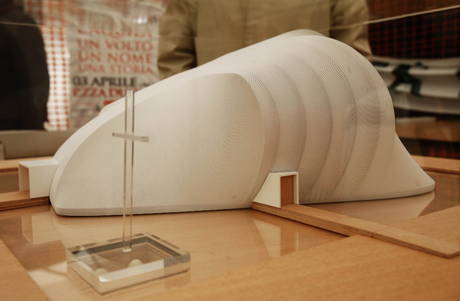I had kinda forgotten, and am only now recollecting some thoughts during my own personal Passiontide.
My Mom is old school enough that I've heard her say many times, albeit wryly, offer it up.
And usually real pain makes that impossible from me, I just can't even think the concept much less embrace it.
But because I was with her during a small period of her convalescence from a relapse of the results of terrible accident last year, I was able, I think for the first time, to observe at close range for an extended period of time someone I love deeply in enormous physical pain at a time when I was in absolutely none.
And so I was able to genuinely pray, (with none of the "this is safe to offer because it won't really happen" thought in the back of my mind,) Me. Take me. Give this pain to me.
But of course, God doesn't work that way. (She's fine now, by the way, thanks for asking.)
I'm not a saint, I'm not going to acquire stigmata, (although it sometimes looks as if I have.)
I'm not a suffering soul who is going to literally take on another's suffering thereby reliving it.
But since that time I am actually able, even when in real pain, to reflect on the sufferings of Christ, reflect on how puny in comparison mine are, actually be glad that they help me focus in some ways, and finally... to offer them up.
Admittedly, this may be easier for me than for some, (then why couldn't you do it sooner, Scelata, huh?) because I am so mercifully free from hypochondria that it never occurs to me that any pain, injury or symptom, no matter how dire, is not self-limiting, or will lead to any permanent damage.
I stayed quiet and dumb, spoke neither evil nor good, but my pain was renewed. My heart grew hot within me, and fire blazed in my... gut.
So even though I had no idea what that was, (and still haven't,) while Himself tried to hustle me into the car and head to the ER for five days running, I was content for those five, and the several obviously-not-so-dire-as-to-require-professional-attention days after, to lie on the couch, moan and groan at the top of my lungs whenever he was away at the theater, (quite and dumb when he was within earshot,) and stare at the television.
And there was much to watch, liturgies from the Vatican and news, but also, quite fortutitously, a "freeview" from Showtime, essentially as bait for the current, new and final season of something called "The Tudors."
We have something called "On Demand" which allows one to view certain movies and series whenever, and also to fast-forward through any scenes which don't appeal to one.
Since the last mainstream entertainment set generally in the same epoch as this was the pretyy much anti-Catholic "Elizabeth" movies, the tone of this was quite a shock.
When I was up and about again, I constantly found myself on the verge, or even in the midst of, recommending it to our priests, our director of liturgy, various musician friends... until I recollected that besides its dramatic (if fact-phobic,) historicity, its sympathetic portrayal of the Church, and some absolutely first-rate performances, it was also filthy.
It had more, and more graphic, and nastier sex than any NC-17 film I've seen. And some of the violence, although not graphically enacted, was stomach-churning.
But it was easy to forget that as I would jump around, fast forward, etc. -- I didn't watch all of it, ( there were more than 20 hours, up to that point, broadcast, I believe,) and didn't watch it in order, and viewed some of it when I couldn't concentrate on much of anything other than my own belly.
I was particularly interested in St Thomas More, (and Jeremy Northam's was avery interesting performance, there was a believable saintliness without sanctimony, ) and Catherine, a marvelous characterization, one of the most warmly attractive I've ever seen, by an Irish actress whose name I can't recall.
But what is coming back to me now is Bosco Hogan's masterful depiction of St. Cardinal John Fisher, and the masterful writing, direction, and filming for him, especially the reenactment of his martyrdom, (the script played fast and loose enough with history, that I don't know if the words were authentic.)
It was truly stirring, moving, and his admission to the crowd of his fear and need for their prayers shocked me to tears and left me drained.
And because I was already thinking of pain and its purpose, and of what I would be willing to endure, (which is not much, I am an appalling coward,) it has really stayed with me, and will, I think.
(I could not be a martyr. Threaten me with, oh, I dunno, scratchy sheets on my bed and I'd deny my own name and give up the family hiding in the attic.
I understand St Peter at the fire in the courtyard more than I understand St Peter upside-down on the cross.)
There were other things about The Tudors that struck me, and are also garbled, in my mind, with Holy Week, and such, and slowly coming back to me...
But meanwhile, back to packing, and I shall be on the lookout for PBS serials and whatnot, with Mr Hogan, (whom I'm beginning to think I may have seen onstage? in Ireland? and is an American ex-pat?)















